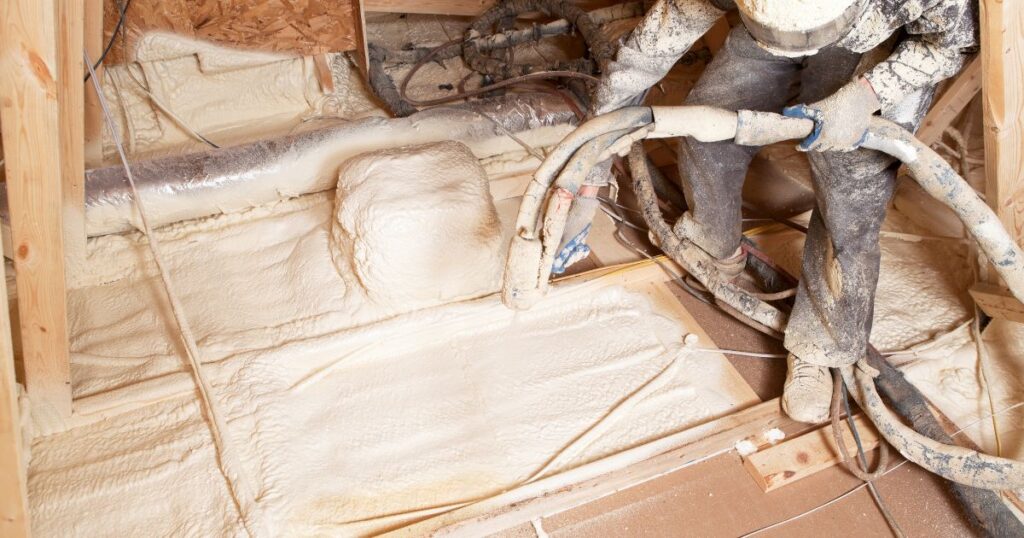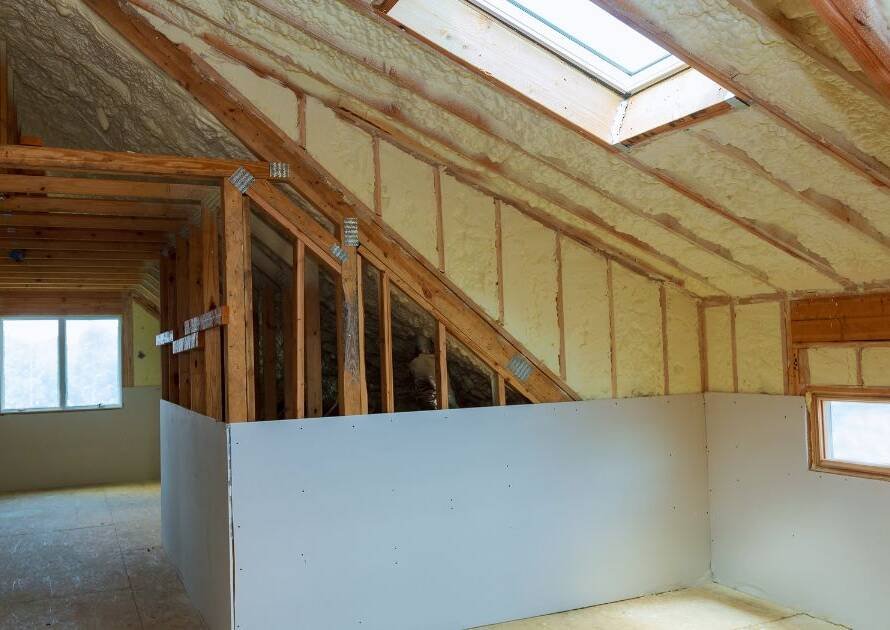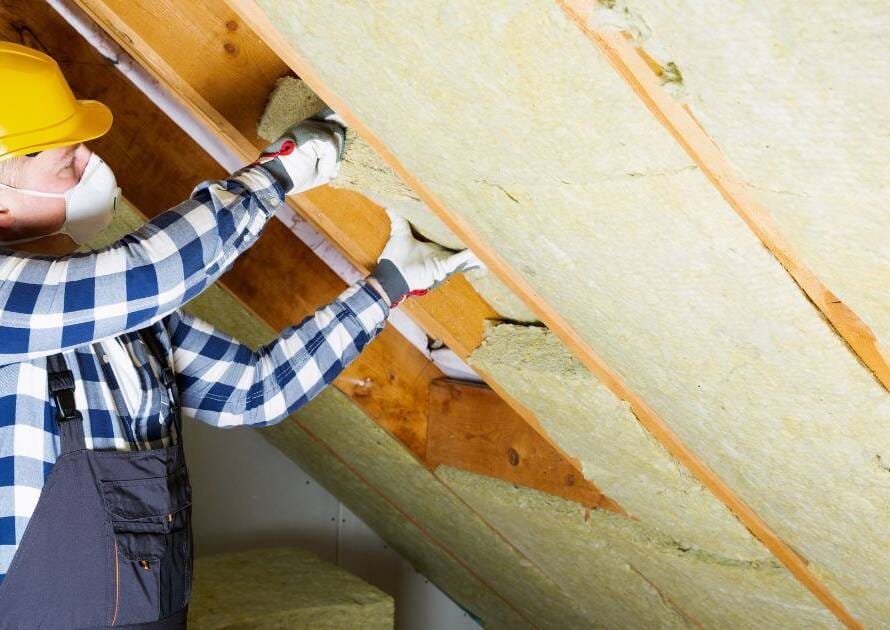Attic insulation is a crucial component in maintaining a comfortable and energy-efficient home. Proper insulation helps regulate indoor temperatures, reduce energy bills, and improve overall home comfort. However, despite its importance, there are many myths and misconceptions surrounding attic insulation that can lead homeowners to make uninformed decisions. In this post, we will debunk some of the most common myths about attic insulation and provide accurate information to help you make the best choices for your home.
“Attic Insulation Is Only Necessary in Cold Climates”

Explanation of the Myth: Many homeowners believe that attic insulation is only essential for keeping homes warm during the winter months. This misconception leads to the assumption that insulation is unnecessary in warmer climates, where heating is not a primary concern.
Debunking the Myth:
- Year-Round Temperature Regulation: Attic insulation plays a vital role in maintaining a consistent indoor temperature throughout the year. During the winter, it prevents heat from escaping the home, keeping it warm. In the summer, it acts as a barrier to keep the hot air outside and the cool air inside, ensuring that your home remains comfortable regardless of the season.
- Energy Savings in Hot Climates: In warmer climates, air conditioning units often work overtime to cool homes, leading to high energy consumption and increased utility bills. Proper attic insulation reduces the need for excessive air conditioning by preventing heat from entering the home. This leads to significant energy savings and lower cooling costs.
- Reduced Heat Gain: Attic insulation helps minimize heat gain during the summer months. By blocking the transfer of heat from the attic into the living spaces, it ensures that the indoor environment remains cooler and more comfortable, reducing the reliance on air conditioning.
- Enhanced HVAC Efficiency: A well-insulated attic improves the efficiency of your heating, ventilation, and air conditioning (HVAC) system. When the HVAC system doesn’t have to work as hard to maintain the desired indoor temperature, it operates more efficiently and has a longer lifespan.
- Comfort and Health Benefits: Beyond energy savings, insulation enhances overall home comfort by preventing temperature fluctuations and drafts. Consistent indoor temperatures contribute to a healthier living environment, reducing the risk of respiratory issues and other health problems associated with extreme temperature changes.
Benefits:
- Energy Efficiency: Proper attic insulation reduces energy consumption by minimizing the need for heating in winter and cooling in summer. This translates to lower utility bills and a reduced carbon footprint.
- Cost Savings: Homeowners can enjoy significant cost savings on their energy bills year-round. The initial investment in insulation is often recouped through these savings within a few years.
- Enhanced Home Comfort: A well-insulated attic ensures a stable and comfortable indoor environment, free from drafts and extreme temperature variations. This enhances the overall quality of life for the home’s occupants.
- Environmental Impact: By reducing energy consumption, attic insulation contributes to a more sustainable and environmentally friendly home. Lower energy usage means fewer greenhouse gas emissions, helping to combat climate change.
In summary, attic insulation is not just for cold climates. Its benefits extend to homes in all regions, providing year-round comfort, energy efficiency, and cost savings. Whether you live in a hot or cold climate, proper attic insulation is a smart investment that pays off in numerous ways.
“More Insulation Is Always Better”

Explanation of the Myth: A common misconception is that adding more insulation will always lead to greater energy efficiency. Homeowners often believe that the more insulation they install, the better their home’s energy performance will be.
Debunking the Myth:
- The Law of Diminishing Returns: Insulation follows the principle of diminishing returns. Initially, adding insulation significantly improves energy efficiency by reducing heat transfer. However, after reaching a certain thickness or R-value (a measure of insulation’s effectiveness), the additional benefits of extra insulation decrease. Beyond this point, adding more insulation yields minimal improvements in energy efficiency and may not justify the extra cost.
- Proper Installation: The effectiveness of insulation is not solely dependent on its quantity but also on its proper installation. Gaps, compression, or improper placement can reduce the insulation’s effectiveness. Professional installation ensures that insulation is installed correctly, maximizing its performance.
- Right Type of Insulation: Different areas of the home and different climates require specific types of insulation. For example, spray foam insulation may be more effective in certain applications than traditional fiberglass batts. Choosing the right type of insulation for your specific needs is crucial for achieving optimal energy efficiency.
Benefits:
- Optimal Insulation Levels: Achieving the right level of insulation for your home ensures maximum energy efficiency without unnecessary expense. Professional assessment can help determine the appropriate amount of insulation needed for your specific situation.
- Cost-Effective Solutions: By understanding the point of diminishing returns, homeowners can avoid overspending on insulation that provides little additional benefit. This ensures a more cost-effective approach to improving energy efficiency.
- Avoiding Potential Issues from Over-Insulation: Over-insulating can lead to issues such as moisture buildup, which can cause mold growth and structural damage. Proper insulation levels help maintain a healthy and safe indoor environment without these risks.
In summary, while insulation is crucial for energy efficiency, more is not always better. Understanding the optimal level of insulation, ensuring proper installation, and choosing the right type of insulation are key factors in maximizing the benefits of attic insulation. This approach not only enhances energy efficiency but also ensures cost-effectiveness and prevents potential issues related to over-insulation.
“Insulation Lasts Forever”

Explanation of the Myth: Many homeowners believe that once insulation is installed, it will remain effective indefinitely, requiring no further attention or maintenance.
Debunking the Myth:
- Degradation Over Time: Insulation materials can degrade due to various factors. Moisture can seep into insulation, reducing its effectiveness and potentially leading to mold growth. Pests, such as rodents or insects, can damage insulation by nesting or burrowing into it. Additionally, insulation can settle or compress over time, which diminishes its insulating properties.
- Regular Inspections: To ensure that insulation continues to perform effectively, regular inspections are necessary. Checking for signs of moisture, pest infestation, and settling can help identify issues early on.
- Potential Replacement: In some cases, insulation may need to be replaced to maintain optimal energy efficiency. This is particularly true if the insulation has been significantly damaged or degraded over time.
Benefits:
- Ensuring Ongoing Energy Efficiency: Regular inspections and maintenance help ensure that insulation remains effective, providing continuous energy savings and maintaining a comfortable indoor temperature.
- Preventing Structural Issues: Proper maintenance of insulation helps prevent moisture-related problems, such as mold growth and structural damage, which can be costly to repair.
- Maintaining Indoor Comfort: Well-maintained insulation contributes to a stable indoor environment, free from drafts and temperature fluctuations, enhancing overall home comfort.
In summary, insulation does not last forever. Factors such as moisture, pests, and settling can degrade its performance over time. Regular inspections and potential replacement are essential to ensure ongoing energy efficiency, prevent structural issues, and maintain indoor comfort. Proper maintenance of insulation is a key component in preserving its benefits and ensuring a comfortable, energy-efficient home.
“Insulation Can Be Installed Anytime”

Explanation of the Myth: Many people believe that insulation can be installed at any time of the year, regardless of specific conditions or circumstances.
Debunking the Myth:
- Ideal Times for Installation: While insulation can technically be installed year-round, certain times are more optimal. For instance, during home renovations is an excellent time to install insulation because walls and attics are already exposed. Mild weather conditions are also ideal because extreme temperatures can complicate the installation process and affect the performance of some insulation materials.
- Proper Planning: Effective insulation installation requires proper planning to avoid potential issues like moisture problems. Installing insulation in damp or wet conditions can trap moisture, leading to mold growth and reduced insulation efficiency. Planning ahead and choosing the right time for installation ensures that the insulation remains dry and functions effectively.
Benefits:
- Optimal Installation Conditions: Installing insulation during optimal conditions ensures that it performs as intended. Avoiding extreme temperatures and moisture-laden environments helps maintain the integrity and effectiveness of the insulation.
- Enhanced Performance: Properly planned insulation installation enhances its performance, ensuring maximum energy efficiency and comfort. Insulation that is correctly installed under the right conditions is more likely to provide long-term benefits.
- Avoiding Potential Issues: By choosing the right time and planning properly, homeowners can avoid potential issues such as moisture buildup, mold growth, and reduced insulation efficiency. This proactive approach ensures that insulation provides the expected benefits without unforeseen problems.
In summary, while insulation can be installed at any time, certain periods and conditions are more favorable. Planning the installation during home renovations or mild weather conditions, and avoiding damp or extreme environments, ensures optimal performance and prevents potential issues. Proper planning and timing are essential for maximizing the benefits of attic insulation.
“Insulation Is Only About Energy Savings”

Explanation of the Myth: There is a common belief that the sole purpose of insulation is to reduce energy bills by improving the efficiency of heating and cooling systems.
Debunking the Myth:
- Noise Reduction: Insulation acts as a sound barrier, reducing the transmission of noise from outside as well as between different rooms within the home. This can lead to a quieter and more peaceful living environment.
- Improved Indoor Air Quality: Proper insulation helps in controlling air leakage, which reduces the infiltration of outdoor pollutants, allergens, and dust into the home. This leads to cleaner and healthier indoor air.
- Moisture Control: Insulation plays a crucial role in controlling moisture levels within the home. By preventing condensation and reducing the risk of mold growth, insulation helps maintain a healthier indoor environment and protects the structural integrity of the home.
- Overall Home Health and Comfort: Beyond energy savings, insulation contributes significantly to the overall comfort and health of a home. It helps in maintaining consistent indoor temperatures, reducing drafts, and creating a more stable and comfortable living environment.
Benefits:
- Comprehensive Understanding of Insulation’s Advantages: Recognizing the multiple benefits of insulation beyond energy savings can help homeowners appreciate its full value. This understanding can guide more informed decisions about home improvements and insulation investments.
- Enhanced Home Comfort: Insulation contributes to a more comfortable living space by reducing noise, maintaining consistent temperatures, and controlling moisture levels.
- Improved Health and Well-Being: Better indoor air quality and moisture control lead to a healthier home environment, which can positively impact the health and well-being of the occupants.
- Protection of Home Investment: By controlling moisture and preventing mold growth, insulation helps protect the home’s structure, preserving its value and reducing the need for costly repairs.
In summary, insulation offers numerous benefits beyond just energy savings. It provides noise reduction, improved indoor air quality, moisture control, and contributes to overall home health and comfort. Understanding these multiple advantages can help homeowners make more informed decisions and fully appreciate the value of proper insulation.
“DIY Insulation Is Just as Effective as Professional Installation”

Explanation of the Myth: Some homeowners believe that they can achieve the same results as professionals by installing insulation themselves, thereby saving money on labor costs.
Debunking the Myth:
- Correct Type, Amount, and Placement: Professional installers have the expertise to select the appropriate type of insulation for different areas of the home. They ensure that the correct amount is used and that it is properly placed to maximize its effectiveness. Improper type or placement of insulation can significantly reduce its efficiency and performance.
- Identification and Addressing of Issues: Professionals are trained to identify and address specific issues that can affect insulation performance, such as air leaks, moisture problems, and gaps in coverage. They use specialized tools and techniques to ensure that insulation is installed correctly and comprehensively.
- Avoiding Common DIY Pitfalls: DIY insulation projects often fall short due to a lack of knowledge and experience. Common mistakes include overstuffing or underfilling insulation, leaving gaps, not sealing air leaks, and improper handling of materials. These pitfalls can lead to reduced insulation effectiveness, increased energy bills, and potential damage to the home.
Benefits:
- Higher Quality Installation: Professional insulation installation ensures a higher quality result. Properly installed insulation performs better, providing greater energy efficiency and comfort.
- Long-Term Effectiveness: With professional installation, insulation is more likely to maintain its effectiveness over the long term. This results in sustained energy savings, better indoor comfort, and fewer maintenance issues.
- Avoiding Common DIY Pitfalls: By opting for professional installation, homeowners can avoid the common pitfalls associated with DIY projects. This reduces the risk of improper installation, which can lead to inefficiencies and additional costs down the line.
In summary, while DIY insulation projects may seem cost-effective, professional installation provides superior results. Professionals ensure the correct type, amount, and placement of insulation, address specific issues, and avoid common DIY mistakes. This leads to higher quality installation, long-term effectiveness, and overall better performance of the insulation.
FAQs About Attic Insulation

Q: Why is attic insulation important for both hot and cold climates?
Ans: Attic insulation is essential for maintaining a consistent indoor temperature year-round. In cold climates, it prevents heat from escaping, keeping the home warm. In hot climates, it helps keep the heat out and the cool air in, reducing the need for air conditioning and lowering energy bills.
Q: Can adding more insulation always improve my home’s energy efficiency?
Ans: Not necessarily. While adding insulation initially increases energy efficiency, there’s a point of diminishing returns where additional insulation provides minimal benefits. It’s important to have the right amount of insulation installed correctly to maximize its effectiveness.
Q: Does insulation need to be replaced over time?
Ans: Yes, insulation can degrade over time due to factors like moisture, pests, and settling. Regular inspections and maintenance are necessary to ensure it remains effective. In some cases, replacement may be required to maintain optimal energy efficiency.
Q: When is the best time to install insulation?
Ans: The best time to install insulation is during home renovations or in mild weather conditions. Proper planning helps avoid issues like moisture problems and ensures effective installation. Installing insulation during optimal conditions maximizes its performance and longevity.
Q: Are there benefits to insulation beyond energy savings?
Ans: Absolutely. Insulation provides multiple benefits, including noise reduction, improved indoor air quality, and moisture control. It contributes to overall home comfort and health by maintaining consistent temperatures and preventing drafts.
Final Thoughts
Understanding and correctly implementing attic insulation is crucial for maximizing its benefits. It’s important to recognize the various advantages of proper insulation beyond just energy savings, including noise reduction, improved indoor air quality, and moisture control.
We encourage you to seek professional advice for your insulation needs. At Capital Renovation, we offer expert attic insulation services to ensure your home is comfortable, energy-efficient, and well-protected. Contact us today to learn more and schedule a consultation.



